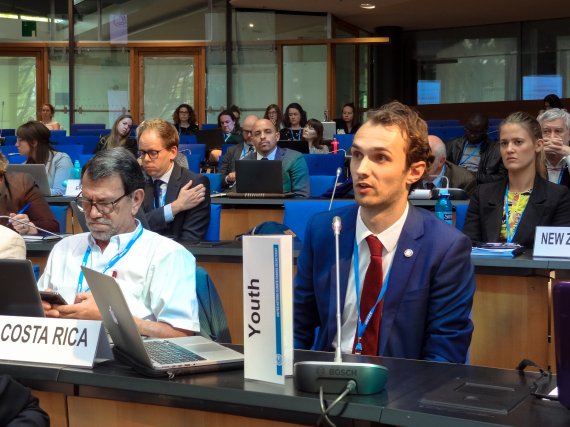Martijn Visser speaking at a UN meeting in Bonn. Photo: Martijn Visser
The Wageningen alumnus (well, almost: he’s waiting for his final exam result) is about to travel to Germany to attend the climate conference in Bonn. Very sustainably, in an electric BMW. In Bonn he will meet the new Dutch minister for Climate Policy, Eric Wiebes. But his main task will be to present young people’s ideas and views on sustainability.‘A climate summit like that attracts about 30,000 people,’ explains Visser, who studied Forest and Nature Conservation. ‘Everyone who has anything to say on the subject will be there. For me, it will mainly be a question of chasing after them and talking to them.’
Brazen
Visser says those at the highest policy levels don’t listen properly to young people even though it is the younger generation’s future that’s at stake. ‘There will often be someone young at the negotiating table at a summit but that’s mainly symbolic. For example, the UN Secretary-General Guterres didn’t have time to talk to us about sustainability, but he was prepared to have a photo taken with us. We refused, in order to make a statement.’Visser attended several summits during his first year as a UN youth delegate, in Marrakesh, Venice, Brussels, Berlin and New York. Together with the other youth delegates and members of youth organizations, he tries to get hold of the right people and draw their attention to the views of young people. After three summits, he figured out how things work in that world. ‘It’s all a question of diplomacy. Heading straight for your goal is not the idea, and there are a lot of rules. Fortunately you can be a bit more brazen as a young person.’ It helps that Visser will be wearing a pink badge on such occasions. ‘That means you are a member of a delegation. NGOs have yellow badges. It’s not at all nice, but whenever you address someone, they immediately look at your badge. You’re taken more seriously if you have a pink badge.’
Visser visits a lot of secondary schools too.
Green bubble
The goodwill factor is also important, says Visser. ‘If you’ve built up a good relationship, you don’t have to take no for an answer as long as you stay polite.’ This was how Visser managed to be one of the few young people allowed to address a UN summit. In New York he held a speech for around 100 ministers. From memory, which is unique in a world where speeches are written out to prevent slips of the tongue. He managed to arrange this through some creative networking. ‘I was in bus 50 from Wageningen to Utrecht because the trains weren’t running, when Hugo von Meijenfeldt, the national Global Goals coordinator at the ministry of Foreign Affairs, got on. I went and sat down next to him and started a conversation. That was how I set the ball rolling.’In addition to summits and government offices, Visser can also often be found at secondary schools, youth conferences and sustainability events. He likes the contact with youngsters but gets frustrated by the lack of engagement with the subject. ‘There’s a green bubble with incredibly committed young people but not much interest elsewhere. I’d like more of a dialogue with youngsters outside that bubble. I plan to focus on that in the coming year.’Visser already knows that he will quit the ‘diplomatic world’ after that. ‘Although I’m carrying out my duties as youth delegate very enthusiastically, I’m not finding it as fulfilling as I expected. There’s a lot of talking and prodding, but not much gets done. Everything is in little steps. I’d rather be working more on projects at a green organization or for an NGO.’

